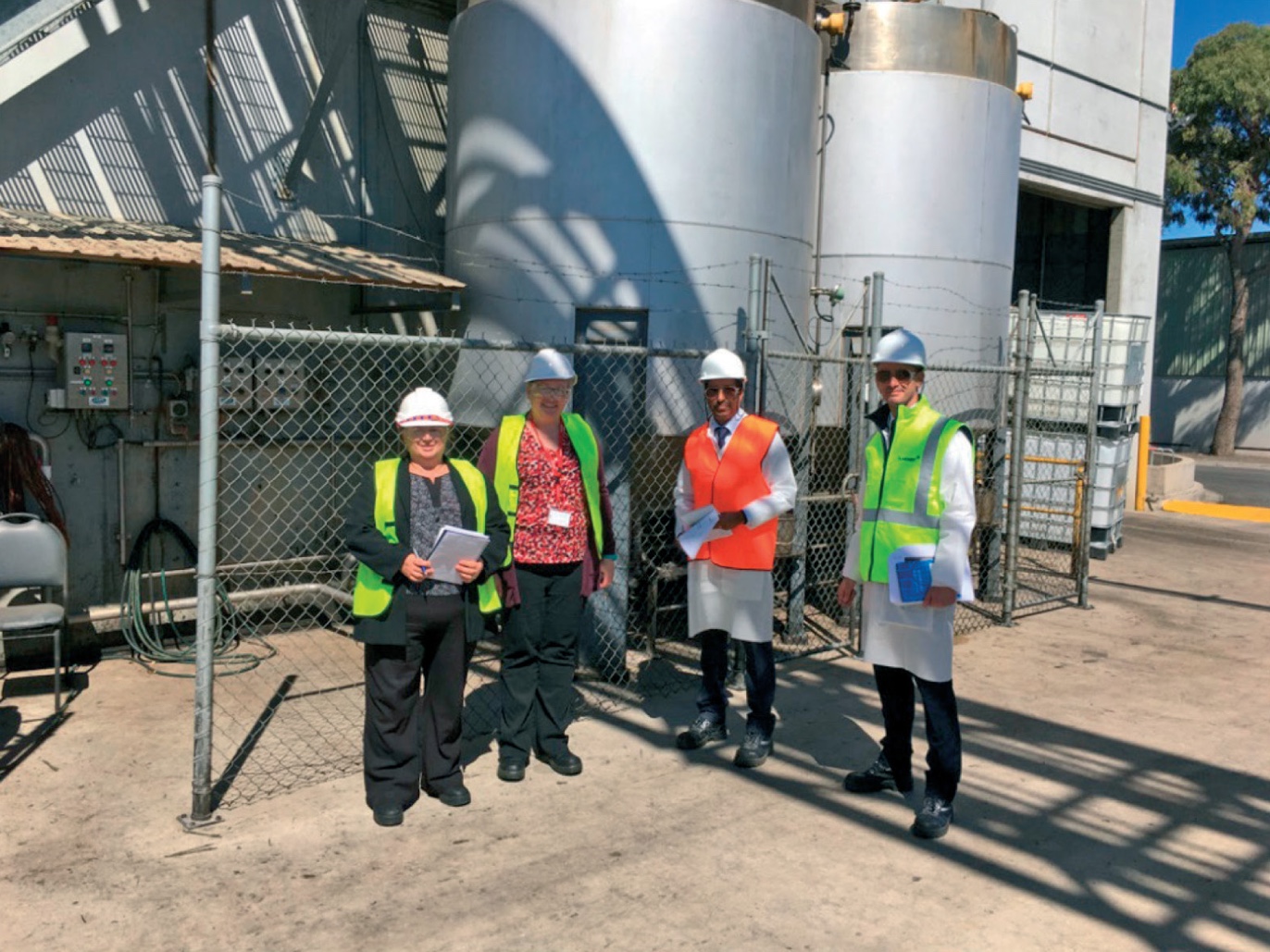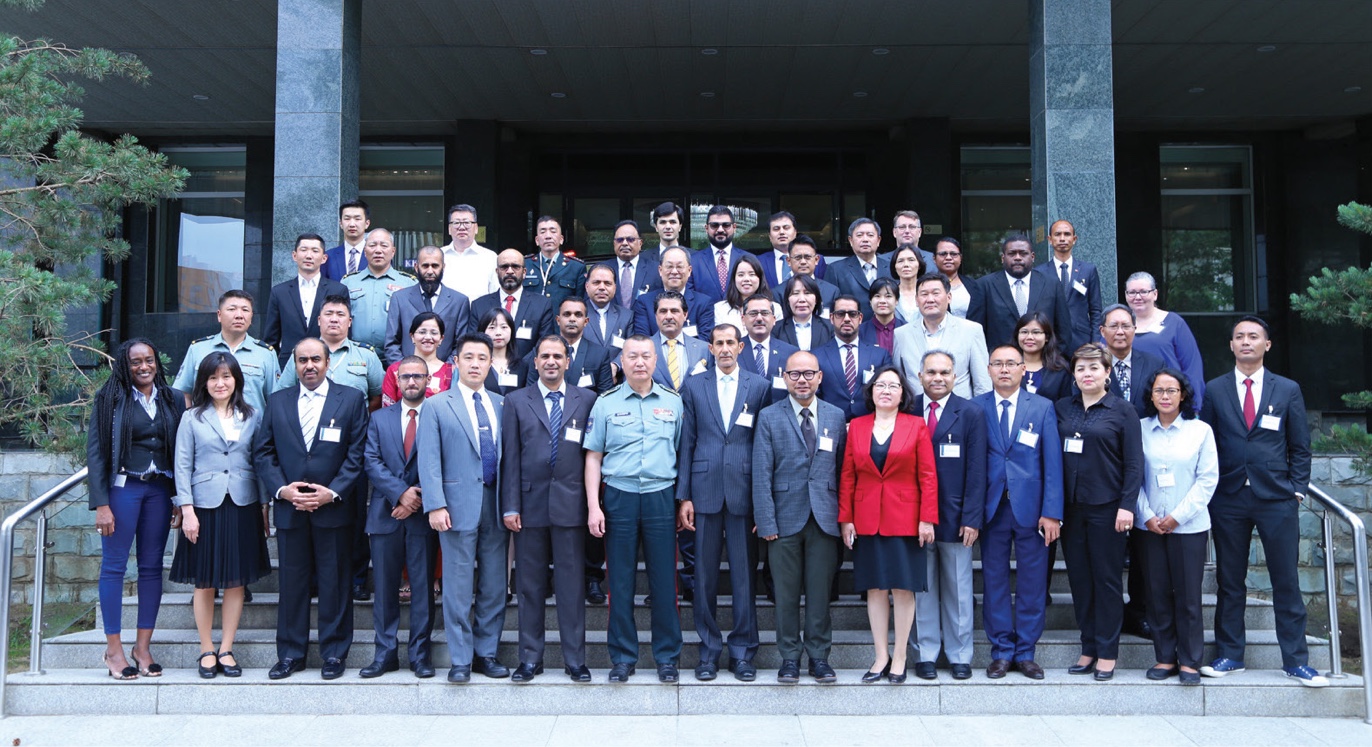Output 1.5: CWC Implementation
Regulation and reporting of Australian chemical activities in accordance with the Chemical Weapons Convention (CWC), and strengthening international implementation of the Convention.
Performance Measures
- Australia's obligations under the CWC are met.
- Effective regulation of CWC-related activities in Australia, involving the chemical industry, research and trade.
- Contribute to strengthening CWC verification and implementation, including through cooperation with the Organisation for the Prohibition of Chemical Weapons (OPCW) and with CWC States Parties.
- Contribute to enhancing regional CWC implementation through targeted outreach.
Performance Assessment
Meeting CWC Obligations
ASNO maintained Australia's strong record of performance in meeting its CWC obligations. Comprehensive and timely annual declarations and notifications were provided to the OPCW via its Secure Information Exchange portal as follows:
- Article VI declaration of imports and exports of CWC-Scheduled chemicals and of past activities at 38 facilities with CWC-relevant chemical production, processing or consumption activities during 2018 (declared in March 2019)
- Article VI declaration of anticipated activities at five CWC-Scheduled chemical facilities during 2019 (declared in September and October 2018) with an additional schedule 2 facility declared in April as the facility anticipated reaching the declaration threshold in 2019
- Article X, paragraph 4, declaration of Australia's national programs for protection against chemical weapons during 2018 (declared in April 2019)
- responses to OPCW Third Person Notes including routine clarification of the operational status of declared chemical plants and
- responses to OPCW notifications and amendments/corrections to inspector details and deletions or additions to the OPCW inspectorate.
Since 1997, the OPCW has conducted 57 routine inspections at declared chemical plants and a Defence protective purposes laboratory in Australia in accordance with the provisions of Article VI of the CWC. In the current reporting period, ASNO facilitated one routine OPCW inspection of a declared ‘Other Chemical Production Facilities' (OCPFs) in Victoria, from 7 to 8 March 2019. The inspection proceeded smoothly and received excellent support and cooperation from government and industry. The OPCW inspection team verified Australia's declarations, including the absence of any undeclared CWC-Schedule 1 chemical production, in accordance with the inspection mandates.

Clariant (Australia) Pty Ltd demonstrates compliance with the Chemical Weapons Convention by facilitating OPCW routine industry inspection with ASNO. Routine inspections of industrial chemical facilities build confidence that CWC member states are not developing chemical weapons.
Online reporting by regulated chemical facilities and import permit holders, in accordance with their statutory obligations, enabled ASNO's preparation of Australia's declaration of past and anticipated chemical activities to the OPCW.
Legislation and Regulation
The permit systems, under the Chemical Weapons (Prohibition) Act 1994 (CWP Act) and Regulation 5J of the Customs (Prohibited Imports) Regulations 1956, continued to operate well. Table 16 provides statistics for the permits issued to facilities producing, processing or consuming CWC-Scheduled chemicals during the current reporting period. Thirty-four facility permits were in effect at 30 June 2019.
During the 2018–19 period two permits were issued for the import of CWC-Schedule 1 chemicals and 64 permits were issued for the import of CWC-Schedule 2 and 3 chemicals.
| CWC- SCHEDULED CHEMICALS | CWP ACT 1994 | PERMIT TYPE | PERMITS AT 30 JUNE 201934 |
NEW PERMITS 2018–19 |
RE-ISSUED PERMITS 2018–19 |
PERMITS CANCELLED 2018–19 |
|---|---|---|---|---|---|---|
| Schedule 1 | s19(4) | Production (Protective) | 1 | 0 | 0 | 0 |
| s19(5) | Production (Research) | 9 | 0 | 2 | 0 | |
| s19(6) | Consumption | 11 | 0 | 3 | 0 | |
| Schedule 2 | s18(1) | Processing | 10 | 1 | 1 | 0 |
| Schedule 3 | s18(1) | Production | 3 | 0 | 3 | 0 |
ASNO is a member of the Australian Government Regulatory Science Network RSN). Established in 2011, the RSN is a network of Australian government agencies responsible for regulating chemical, biological or radiological materials.
RSN membership includes:
- Australian Government Department of Agriculture and Water Resources (Agriculture)
- Australian Government Department of the Environment (Environment)
- Australian Pesticides and Veterinary Medicines Authority (APVMA)
- Australian Radiation Protection and Nuclear Safety Agency (ARPANSA)
- Australian Safeguards and Non-Proliferation Office (ASNO)
- Defence Export Control (DEC)
- Food Standards Australia New Zealand (FSANZ)
- National Health and Medical Research Council (NHMRC)
- National Industrial Chemicals Notification and Assessment Scheme (NICNAS)
- Office of Chemical Safety, Department of Health (OCS)
- Office of the Gene Technology Regulator (OGTR)
- Safe Work Australia (SWA) and
- Therapeutic Goods Administration (TGA).
The RSN is a forum for scientific and technical staff from member agencies to discuss regulatory scientific issues and improve interagency cooperation. The objective of the RSN is to improve the performance of Australian government regulatory agencies by strengthening evidence-based decision-making by:
- improving the quality and consistency of regulatory science
- fostering collaboration and sharing scientific knowledge and experience between agencies and
- contributing to regulatory science issues.
The RSN committee meets regularly and conducts at least one major science-focused activity each year to promote regulatory science exchange among the member agencies. Other activities include joint agency seminars, interagency workshops, symposiums and conference presentations.
Cooperation with the OPCW and CWC States Parties
ASNO has continued to support OPCW initiatives and has worked with other States Parties to encourage effective implementation of the CWC.
In March 2019, Australia contributed EUR100,000 to the OPCW's Trust Fund for Syria Missions. The money will go towards boosting the OPCW's ability to investigate and attribute responsibility for use of chemical weapons.
ASNO provided responses to the following OPCW surveys and requests for information to assist the OPCW to enhance verification measures under the CWC and to share best practices that promote a chemical security culture in States Parties as part of chemical counter-terrorism efforts:
- questionnaire on the status of implementation of Article VII of the Chemical Weapons Convention and
- preparations for developing the second edition of a Needs and Best Practices Report included a Compilation of Tools, Guidance and Best Practices in Chemical Safety and Security Management in Australia.35
ASNO provided technical advice and contributed to policy development in preparation for OPCW Executive Council meetings, industry cluster meetings and informal consultations in The Hague. For example, ASNO:
- attended the 23rd Conference of the States Parties to the CWC held from 19–20 November 2018 and the Fourth Review Conference held from 21–30 November 2018, including various bilateral side meetings with the OPCW and other States Parties and
- attended the 17th Regional Meeting of National Authorities of States Parties in Asia held from 25 to 27 June 2019 in Ulaanbaatar, Mongolia.

Seventeenth Regional Meeting of National Authorities of States Parties in Asia held from 25 to 27 June 2019 in Ulaanbaatar, Mongolia. (Photo courtesy of Mongolian National Authority)
ASNO also attended, and presented at, the OPCW and Malaysian Government jointly hosted workshop in April on the ‘Role of Implementing Legislation on the Chemical Weapons Convention (CWC) in addressing Threats arising from non-State actors'. The workshop was attended by representatives from 12 south-east Asian countries, the European Union, UN 1540 Committee, UN Interregional Crime and Justice Research Institute (UNICRI), World Customs Organization (WCO), UN Office on Drugs and Crime (UNODC), INTERPOL, the OPCW and Australia's National Authority for the CWC. ASNO provided presentations outlining the National Code of Practice of Chemicals of Security Concern that goes beyond the requirements of the Chemical Weapons Convention and aims to prevent the diversion of chemicals in Australia by non-state actors, and training initiatives for first responders. Presentations highlighted terrorist interest in the use of chemical weapons and the recent use of chemical weapons in targeted killings. Each State Party to the CWC is required implement legislation to enable prosecution for the use of chemical weapons within its borders or elsewhere by any of its citizens. Eight of the countries represented at the workshop had not yet introduced CWC implementing legislation. The aim of the workshop was to assist and encourage those countries to fulfil their obligations under the Chemical Weapons Convention.
Australia also has representatives, in their personal capacity, on the OPCW's Scientific Advisory Board and the Advisory Board on Education and Outreach.
Domestic Outreach
ASNO continued its close cooperation on CWC implementation issues with relevant Government agencies including the Department of Home Affairs; Defence Export Controls; Australian Border Force; Australian Bureau of Statistics; the National Industrial and Chemicals Notification and Assessment Scheme.
To assist ASNO in meeting its CWC reporting obligations and to ensure compliance with CWC-relevant legislation, ASNO also continued to strengthen engagement with its constituency in industry, research and trade, including with non-Government agencies and associations including Chemistry Australia and The Royal Australian Chemical Institute.
34 Permit numbers include new, existing and renewed permits
35 This ‘Compilation’ was made possible through contributions by federal and state/territory agencies, including industry associations that have responsibility for chemical safety and security management.

